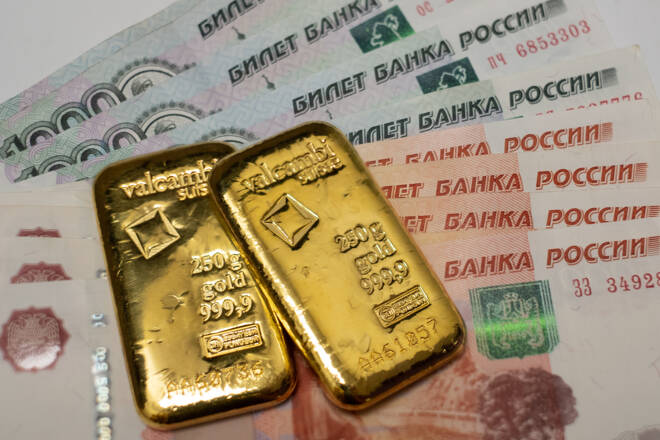Advertisement
Advertisement
Are Gold & Commodities the Answer to the Western Currency Crisis?
By:
As the Western currency system balances on the brink of a collapse, it might be high time for a history lesson
In this episode of ‘Live from the Vault’ Alastair Macleod joins Andrew to thoroughly analyse the measurable benefits of backing a currency with gold, showcasing the PetroRuble as a working example of currency commoditisation.
Drawing a sequence of historic parallels, the famed economist contemplates the tactical steps taken by Russia and China to shield themselves from inflation that seem to be progressively corroding the Western currency system.
The collapsing Western currency system
With the PetroRuble continuously strengthening its value against the dollar, it is becoming increasingly noticeable that Russian-centric sanctions imposed by the West have never brought the expected results in penalising the country’s aggression on Ukraine.
By pegging their currency to gold in exchange for oil and commodities, Russia has in fact managed to expose some of the foundational insufficiencies of the Western currency system, which seems to be already balancing on the brink of a collapse.
Moving to a commodity-based currency system
In fact, it is the Western and Eastern approaches to commodities – especially physical gold – that might play a major role in how efficiently both hemispheres will face the upcoming food shortage and further currency debasement. By designing and issuing a commodity-based currency, China enters the path of gaining economic independence from the dollar, protecting its citizens from the shortcomings of the Western financial system in the long run.
As the prices keep rising unceasingly across America and Europe It might be worth questioning the Federal Reserve’s preferred narrative on the inflation surge being a transitory occurrence and asking whether the fiat system is capable of sustaining itself any longer.
History always repeats itself at some point
With the purchasing power of Western currencies sinking, the idea of creating and issuing yet another, new central bank currency might appear tempting. However, history is filled with the government’s failed attempts at creating a sustainable financial solution that would gain enough public confidence to stand the test of time and resist inflation.
It might be worth drawing a parallel between how China has recovered from post-war economic destitution and elevated itself into the position of one of the world’s wealthiest nations, simply by reducing the states’ intervention in the private sector.
As Alastair explains:
“The problem is that the central bank does not understand money. In British law, money is not currency. The currency is a matter of the users, it is us who actually make that decision. This is why gold and silver have always been money because they’re the basis for coinage. And currencies are something different.“
Reintroducing sound money as the centrepiece of the Western currency system might require central banks to perform an acrobatic somersault. The irony of the Russian sanctions is that they might have actually opened the gold window of opportunity for amassing physical reserves, and accelerated this process.
About the Author
Jai Bifulcocontributor
Jai has a track record of driving business growth in director, executive, partner, advisor, and global leadership roles at both established international and early-stage companies. His diverse commercial and operational experience spans the FinTech, precious metals, mining, financial services, investment and trading spaces.
Advertisement
